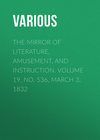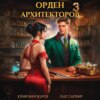Loe raamatut: «The Mirror of Literature, Amusement, and Instruction. Volume 19, No. 536, March 3, 1832», lehekülg 4
THE SKETCH-BOOK
SCOTTISH SPORTING
From the Letters of Two Sportsmen; with Recollections of the Ettrick Shepherd
(For the Mirror.)
After visiting Thoms, the sculptor, "Burns's cottage," "Halloway Kirk," Monument, &c., in Ayrshire, we toddled on over to Dumfries, and had a crack with poor "Rabbie Burns's" widow, not forgetting McDiarmid the author; thence to Moffat, and up that dismal glen, the pass of Moffat, to the grey mare's tail, a waterfall, so called from its resembling the silvery tail of a grey mare; and truly, if the simile were extended into infinitude, which from its sublimity it would admit of, we might compare its waving, silky stream swinging over the broad face of its lofty grey rock, to the tail of the pale horse of Revelation, over the chaos of time. It was a sombre, solemn sort of a day, and the dense clouds hung curtaining down the mountain sides, like our living pall as it were—I scarcely know how—but we felt dismally until we took a dram and got into a perspiration, with tugging up the sinuosities of the cliff's, to the summit of the waterfall. Loch Skein, where we were galvanized, electrified, magnetized, and petrified, all at once, by the quackery, clackery, flappery, quatter, splatter, clatter, scatter, and dash-de-blash, and squash, of a flock of wild ducks, on its reedy, flaggy surface; O, what a scutter was there! Our hearts, too full, leapt into our mouths, but our guns were turned into tons of lead, and ere we could heave them up to our shoulders of clay, the thousand had fled into the eternal grey mist of the mountain, like the dispersion of a confused dream. There we stood like two sumphs, (as Hogg calls those who are ganging a bit aglee in their wits) gaping and staring at each other with a look which said, why did not youshoot? Our dogs too stood as stiff as two pumps, with tails standing out like the handles! Apropos—talking of Hogg, the poet, we called to see him in his half-acre island in Eltrive Lake, and truly we met with that burning hot reception which we had anticipated from Blackwood's Magazine description of him. We had no notes of introductionexcept the notes which our guns pricked upon the echoes of Ettric Forest, and which James Hogg heard and answered with a view-hallo, for us to "come awa doon the brae an' tak' a dram o'speerits," and so we did, and in true Highland style; he met us at the door and gave us a drain from the bottle, first gulping a glass himself of that double-strong like & fire-eater, without a twink of the eye or a wince of the mouth; and then with a grip o' the daddle, which made the fingers crack, he pulled us into his bonnie wee bit shooting box of a house, with a "Come awa ben ye'll be the better o' a bite o' venison pasty;" so in we went, and were introduced to his bonnie wife and sousy barnes, which latter, Jammie Hogg nursed as though he lov'd 'em frae the uttermost ends o' his sowl.
Campbell has it against Byron, that "the poetic temperament is incompatible with matrimonial felicity." Fudge, fudge, Mr. Campbell, did you ever visit James Hogg?
Well, we sat down to take a snack with James and an extraordinary monkey of his, which he has dressed in the garb of a Highland soldier, and which too, sat down at table, and played his knife and fork like a true epicure. "An extrornry crater is that wee Heelan-man o' mine, gentlemen, he can conduc himsel' as weel's ony Christan man at table, and aft when I'm pennin' a bit rhyme 'thegither, the crater'll lowp up 'ith chair anent me and tak' up a pen, in exac emeetation o' me, and keck into my 'een in his cunnin way, as if he was speering me what to write aboot; he surely maun ha' a feck o' thocht in his heed if are could gar him spak it; but ye ken his horsemanship beats a'. I had a spire-haired collie, a breed atween a Heelan lurcher, a grew, and a wolf, dog, a meety, muckle collie he is for sure—weel, gentlemen, do ye ken, he a' rides on him when we hoont the tod (fox), an' to see him girt a screep o' red flannin on for a saddle, that the neer-do-weel toor fra a beggar-wife's tattered duds ane day; an' then to see him lowp on like a mountebank, and sit skreighin an' chatrin, an' cronkin like a paddock on a clud o'yearth. O, its a lachin teeklesome sicht for sure—an' then hee'l thud, thud, thud his wee bit neive 'ith shouther 'oth collie, an' steek his toes in his side, just for a' the world like a Newmarket jockey, an' then hee'l turn him roon behint-afore an' play treeks, till collie gerns at him; an' then beway o' makin friens again, hee'l streek an' pat him, an' peek the ferlie oot o' his hurdles; an' then when we're a' ready for gannin awa, to be sure what a dirdum an' stramash do they twa keek up; an' then aff they flee like the deevil in a gale o' wind, an' are oot o' sicht before ye can say owr the border an' far awa. But I ha' just been speerin the forester aboot the tod (fox), an' he gars me gang owr the muir to Ettric Forest, an' leuk in a cleuch in a rock there is there, an' I shall find the half-peckit banes o' a joop o' mine that stray'd yestreen. So, gentlemen, if yer fond o' oor kin o' sportin, ye shall hae such a sicht o' rinnin an' ridin as ye ne'er saw heretofore we your twa een."
We readily accepted the invite, and off we set in company with the "Ettric Shepherd" and his monkey, and certainly it was a "teeklesome sicht" to see him mounted on the long, lank, wire-haired, shaggy wolf-dog-grew-lurcher, while he in play was scouring round and round the wild and barren moor; away and away as swift as the wind, over brae and bourn and bog they went, like a red petticoated witch on a besom, flying in the storm.
On our way we fell in with the foresters, who were going a deer-stalking; they had a buck to kill for the duke, so we joined company, and gave that satisfactory shrug of the shoulders, with the expectation of sport, that a spider would feel while sitting in the corner of a hollow nut-shell, and seeing his victim already entangled in his web, while he was whetting his appetite with suspended hope, in dream of anticipated fattenings.
We made the best of our way to the watering-place haunt of the deer. Silence was the word, and we crept on tip-toe and tip-toe, scarce breathing, keeping ever out of the wind's course; for they have an ear of silk, and an eye of light, and a scent so exquisite that they could, if it were possible, hear the tread, see the essence, and scent the breath, of a spirit. This watering haunt was in a lonely glen, which was commanded, within pistol-shot, by a small clump of trees, which were under-grown by brushwood and brambles, and wherein we ambushed ourselves. Ay, there it was, the "gory bed," where "this day a stag must die," just one hundred yards from that said clump. Hush, hush, silence, silence, "Swallow your brith," says Jammie Hogg, hush, "Heck, cack, a," says the monkey, "the deevil tak' the monkey," says Jammie, "whist, whist, hush!"
(To be concluded in our next.)
THE SELECTOR; AND LITERARY NOTICES OF NEW WORKS
THE GEORGIAN ERA
(Concluded from page 124.)
Sheridan
"In early life, Sheridan had been generally accounted handsome: he was rather above the middle size, and well proportioned. He excelled in several manly exercises: he was a proficient in horsemanship, and danced with great elegance. His eyes were black, brilliant, and always particularly expressive. Sir Joshua Reynolds, who painted his portrait, is said to have affirmed, that their pupils were larger than those of any human being he had ever met with. They retained their beauty to the last; but the lower parts of his face exhibited, in his latter years, the usual effects of intemperance. His arms were strong, although by no means large; and his hands small and delicate. On a cast of one of them, the following appropriate couplet is stated, by Moore, to have been written:—
Good at a fight, but better at a play;
Godlike in giving; but the devil to pay!
"No man of his day possessed so much tact in appropriating and adorning the wit of others. He pillaged his predecessors of their ideas, with as much skill and effrontery as he did his contemporaries of their money. It was his ambition to appear indolent; but he was, in fact, particularly, though not regularly laborious. The most striking parts of his best speeches were written and rewritten, on separate slips of paper, and, in many cases, laid by for years, before they were spoken. He not only elaborately polished his good ideas, but, when they were finished, waited patiently, until an opportunity occurred of uttering them with the best effect. Moore states, that the only time he could have had for the pre-arrangement of his conceptions, must have been during the many hours of the day which he passed in bed; when, frequently, while the world gave him credit for being asleep, he was employed in laying the frame-work of his wit and eloquence for the evening.
"Like that of his great political rival, Pitt, his eloquence required the stimulus of the bottle. Port was his favourite wine; it quickened, he said, the circulation and the fancy together; adding, that he seldom spoke to his satisfaction until after he had taken a couple of bottles. Arthur O'Leary used to remark, that, like a porter, he never was steady unless he had a load on his head.
"He also needed the excitement of wine when engaged in composition. 'If an idea be reluctant,' he would sometimes say, 'a glass of port ripens it, and it bursts forth; if it come freely, a glass of port is a glorious reward for it.' He usually wrote at night, with several candles burning around him.
"The most serious appointments were, to him, matters of no importance. After promising to attend the funeral of his friend Richardson, he arrived at the church after the conclusion of the burial service; which, however, to their mutual disgrace, he prevailed on the clergyman to repeat. But, notwithstanding his liability to the charge of desecration, even in more than one instance, he professed, and it is but charitable to presume that he felt, in his better moments, a deep sense of the worth of piety. He had ever considered, he said, a deliberate disposition to make proselytes in infidelity, as an unaccountable depravity, a brutal outrage, the motive for which he had never been able to trace or conceive.
"Sheridan enjoyed a distinguished reputation for colloquial wit. From among the best of the occasional dicta, &c. attributed to him, the following are selected:—
"An elderly maiden lady, an inmate of a country house, at which Sheridan was passing a few days, expressed an inclination to take a stroll with him, but he excused himself, on account of the badness of the weather. Shortly afterwards, she met him sneaking out alone.
'So, Mr. Sheridan,' said she, 'it has cleared up.' 'Yes, madam,' was the reply; 'it certainly has cleared up enough for one, but not enough for two;' and off he went.
"He jocularly observed, on one occasion, to a creditor, who peremptorily required payment of the interest due on a long-standing debt,' My dear sir, you know it is not my interest to pay the principal; nor is it my principle to pay the interest.'
"One day, the prince of Wales having expatiated on the beauty of Dr. Darwin's opinion, that the reason why the bosom of a beautiful woman possesses such a fascinating effect on man is, because he derived from that source the first pleasurable sensations of his infancy. Sheridan ridiculed the idea very happily. 'Such children, then,' said he, 'as are brought up by hand, must needs be indebted for similar sensations to a very different object; and yet, I believe, no man has ever felt any intense emotions of amatory delight at beholding a pap-spoon.'
"Boaden, the author of several theatrical pieces, having given Drury lane theatre the title of a wilderness, Sheridan, when requested, shortly afterwards, to produce a tragedy, written by Boaden, replied, 'The wise and discreet author calls our house a wilderness:—now, I don't mind allowing the oracle to have his opinion; but it is really too much for him to expect, that I will suffer him to prove his words.'
"Kelly having to perform an Irish character, Johnstone took great pains to instruct him in the brogue, but with so little success, that Sheridan said, on entering the green-room, at the conclusion of the piece, 'Bravo, Kelly! I never heard you speak such good English in all my life!'
"He delighted in practical jokes, and seems to have enjoyed a sheer piece of mischief, with all the gusto of a school-boy. At this kind of sport, Tickell and Sheridan were often play-fellows: and the tricks which they inflicted on each other, were frequently attended with rather unpleasant consequences. One night, he induced Tickell to follow him down a dark passage, on the floor of which he had placed all the plates and dishes he could muster, in such a manner, that while a clear path was left open for his own escape, it would have been a miracle if Tickell did not smash two-thirds of them. The result was as Sheridan had anticipated: Tickell fell among the crockery, which so severely cut him in many places, that Lord John Townshend found him, the next day, in bed, and covered with patches. 'Sheridan has behaved atrociously towards me,' said he, 'and I am resolved to be revenged on him. But,' added he, his admiration at the trick entirely subduing his indignation, 'how amazingly well it was managed!'










